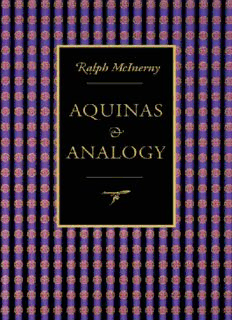
Aquinas and Analogy PDF
Preview Aquinas and Analogy
AQUINAS AND ANALOGY Ralph McInerny AQUINAS AND ANALOGY The Catholic University of America Press Washington, D.C. Copyright © 1996 The Catholic University of America Press All rights reserved Printed in the United States of America The paper used in this publication meets the minimum requirements of American National Standards for Information Science-Permanence of Paper for Printed Library materials, ANSI Z39.48-1984. LIBRARY OF CONGRESS CATALOGING-IN-PUBLICATION DATA McInerny, Ralph M. Aquinas and analogy / Ralph M. McInerny. p. em. Includes bibliographical references and index. I. Thomas, Aquinas, Saint, 1225 ?-1274.-Contributions in doctrine of analogy. 2. Analogy-History. 3. Analogy (Religion) -History of doctrines-Middle Ages, 600-1500. 4. Analogy (Religion)-History of doctrines-16th century. 5. Cajetan, Tommaso de Vio, I469-1 5 34-Contributions in doctrine of analogy. 1. Title. B765·T54M236 1996 169' .092-dc20 96-16793 ISBN 0-8132-0848-3 (cloth: alk. paper) ISBN 0-8132-°932-3 (pbk: alk. paper) For David Burrell, C.S.c. amicus arnica CONTENTS Preface IX PART ONE: PROLEGOMENA I. Where Cajetan Went Wrong 3 2. Analogy in Aristotle 30 PART TWO: ANALOGOUS NAMES The Prospect Before Us 51 3· How Words Signify 53 4· Analogous Names 86 5· Kinds of Analogous Name 102 6. Metaphor and Analogy II6 7· Analogy Is Analogous 137 8. Analogy and Discovery 142 9· Analogy and Participation 152 Select Bibliography I6S Index I67 PREFACE Since publishing The Logic of Analogy in I96I, I have continued to think about and write on the subject, almost exclusively as it pertains to the teaching of Thomas Aquinas. Some of these writings were brought together in Studies in Analogy (I968). Both books have been out of print for a number of years and the question arose as to whether they should be reprinted. I decided that it would be preferable to treat the matter afresh. The result is this book. Like many others, I found Cardinal Cajetan's treatise on the subject oddly dissatisfying. It is no pleasure for a Thomist to depart from the views of so eminent a leader of the school, but etiam Homerus dormitat and when Cajetan nodded, his head hit the table. I have given here as clear a statement as I can of the nature of the great cardinal's mistake. The reader will find below my argument that Cajetan embraced the very fallacy Thomas was defusing in the text that provided the fundamental structure of the cardinal's treatise. After examining the role that analogy plays in the thought of Aris totle, and the degree to which Aristotelian analogy can be taken to be regulative of Thomas's usage, I move systematically through the topics that enable one to see the precise character of Thomas's teach ing. I have tried to make this book as straightforward as I can. If I am wrong, the critic will have no trouble discerning his target. If I am correct, a good deal that has been, and continues to be, said about analogy in Thomas Aquinas is simply wrongheaded. The Uni- IX
Description: